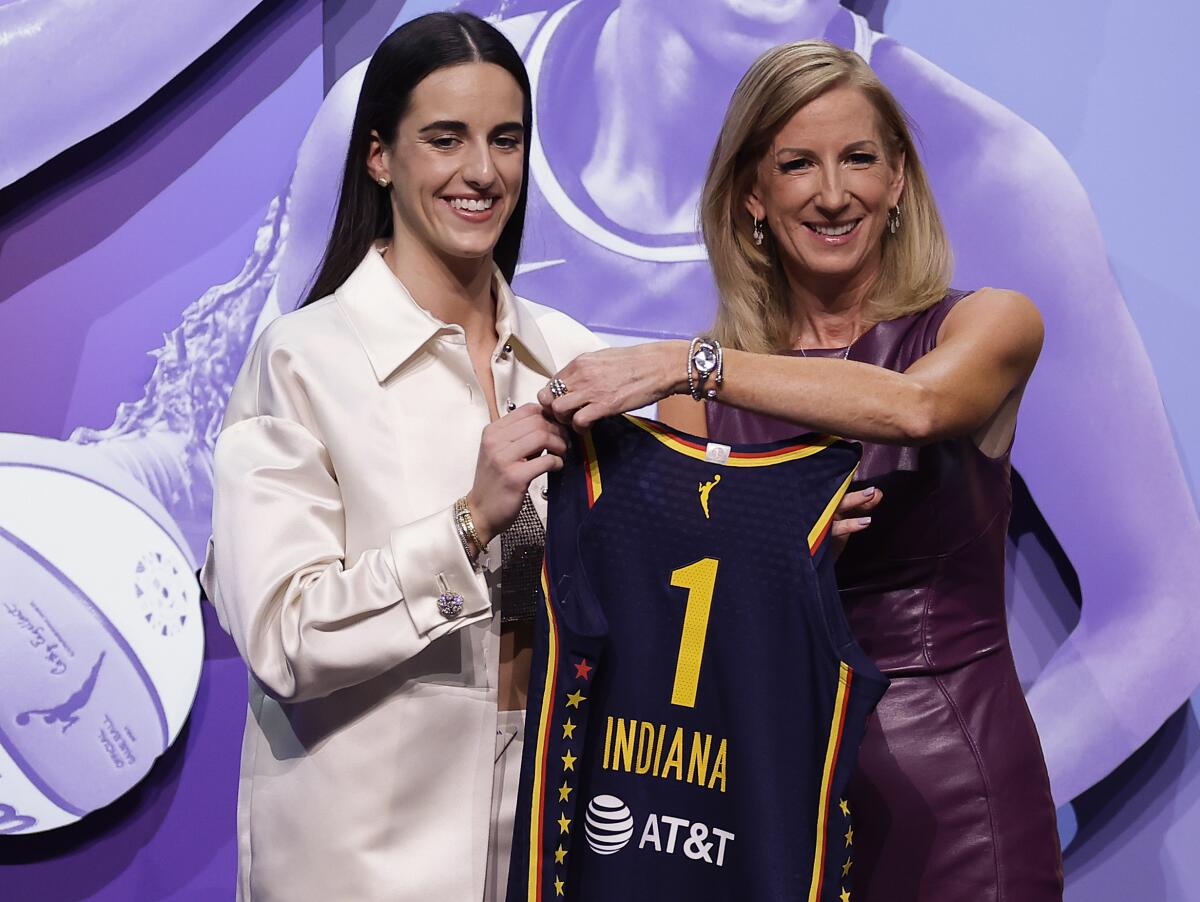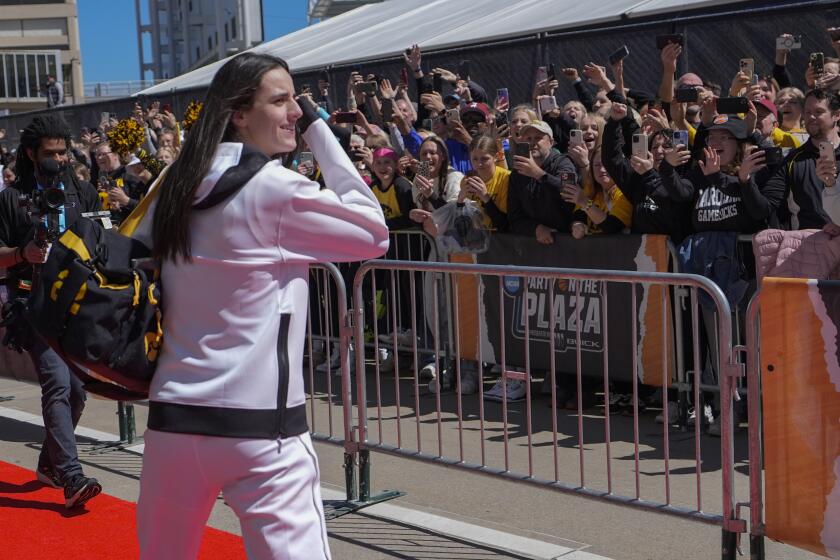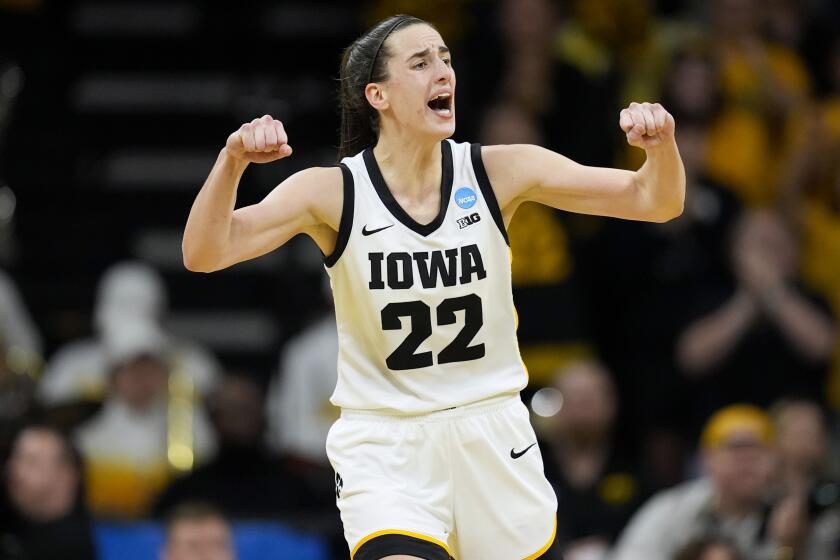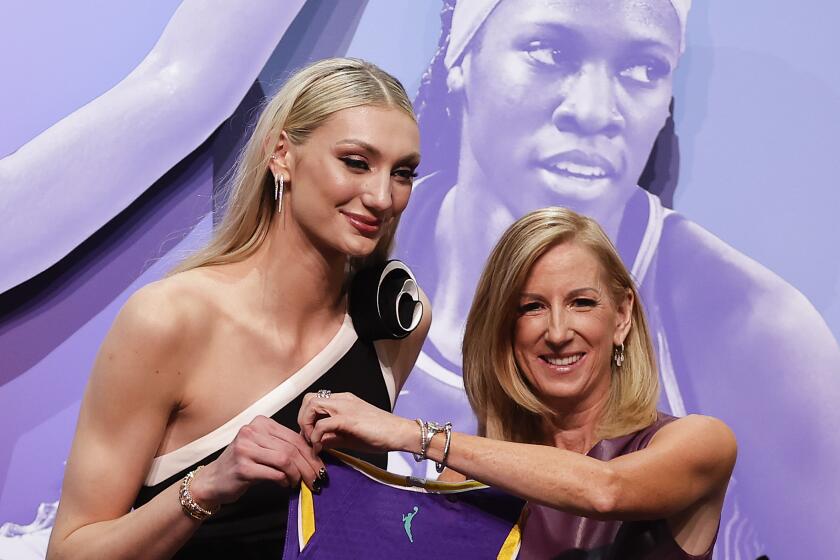Caitlin Clark is worth millions. Why will she only make $76,535 in base salary as a WNBA rookie?

- Share via
Caitlin Clark is worth millions.
She will make a fraction of that as a WNBA rookie.
For the record:
1:27 p.m. April 16, 2024A previous version of this article reported the value of Bryce Young’s contract with the Carolina Panthers as $55.2 million. Young’s deal is worth $38 million.
Clark, the Iowa phenomenon who set the NCAA career basketball scoring record and helped the women’s March Madness tournament reach all-time highs in TV ratings, was the No. 1 overall pick for the Indiana Fever in Monday’s WNBA draft.
Her jersey sales are already through the roof. The league scheduled the Fever for 36 nationally televised games, more than any other team this season, several days before Clark officially became a member of the team. Likewise, tickets for opposing teams’ home games against Indiana saw a spike in interest (and price) long before draft night.
Clark will make $76,535 in base salary this year as a WNBA rookie, part of a four-year contract worth $338,056.
It’s the same received by the other three players drafted in the top four — No. 2 Cameron Brink of Stanford (Sparks), No. 3 Kamilla Cardoso of national champion South Carolina (Chicago Sky) and No. 4 Rickea Jackson of Tennessee (Sparks) — all of whom were part of a class loaded with “household names,” as WNBA commissioner Cathy Engelbert put it before the draft.
Caitlin Clark is expected to go No. 1 to the Indiana Fever in the WNBA draft, and fans will get to see the Iowa star a lot on TV. Indiana has the most national broadcasts.
Those salaries are the maximum allowed for rookies, as laid out in the most recent collective bargaining agreement between the WNBA and its players association. That CBA runs through the 2027 season, although the players can opt out of the deal following the 2025 season, if they decide as a group to do so by Nov. 1 of this year.
As the WNBA pointed out in a statement emailed to The Times on Tuesday night, however, Clark will have the opportunity to make more money on top of her base salary.
“Caitlin Clark stands to make a half million dollars or more in WNBA earnings this coming season,” the statement read, “in addition to what she will receive through endorsements and other partnerships, which has been reported to already exceed $3 million.”
According to the league’s CBA, select players can earn up to $250,000 each a year by entering into a marketing and promotional agreement with the league and a maximum $150,000 a year through a similar agreement with their individual teams.
The CBA also provides for merit bonuses paid to players for a number of team and individual achievements, including advancement in the playoffs, making the All-WNBA and All-Star teams, and earning such year-end awards as MVP or rookie of the year.
In addition to the individual endorsement deals she has already secured, Clark will undoubtedly will have a stream of other lucrative opportunities come her way. BIG3 co-founder Ice Cube has offered Clark $5 million to become the first female player in his three-on-three basketball league.
Ice Cube says that his BIG3 basketball league has offered to make Caitlin Clark its first woman player. She’s in the NCAA tournament with Iowa and has declared for the WNBA draft.
Still, it might come as a bit of a shock to learn how relatively little Clark and other star WNBA rookies will make in base salary, especially compared with their counterparts in other leagues. Like Clark, Victor Wembanyama was seen as a generational talent when he was selected No. 1 overall by the San Antonio Spurs in last year’s draft. His four-year rookie contract is worth $55.2 million.
Bryce Young, drafted No. 1 overall by the NFL’s Carolina Panthers last year, is under a four-year, $38-million contract. Top NHL draft pick Connor Bedard received a three-year, $13.35-million contract from the Chicago Blackhawks. Paul Skenes received a $9.2-million signing bonus from the Pittsburgh Pirates after being selected as the top pick in last year’s Major League Baseball draft.
Charlotte’s Ben Bender, the No. 1 overall pick in the 2022 MLS draft, had a base rookie salary lower than Clark’s ($65,500), but earned $83,000 in guaranteed compensation. On the women’s side, Angel City’s Alyssa Thompson secured a three-year contract worth $1 million after being selected as the No. 1 overall pick in 2023 for the thriving National Women’s Soccer League.
That league, which has grown from eight teams in 2012 to 14 currently, recently announced a four-year, $240-million broadcast deal with CBS, Amazon, ESPN and Scripps, which is worth 40 times the value of its old media rights contract.
The WNBA might be in a position for similar growth. The league will expand to 13 teams next season with the addition of a franchise affiliated with the NBA’s Golden State Warriors, and Engelbert told reporters Monday she is “pretty confident” the league will expand to 16 teams by 2028.
In addition, Engelbert said last week that she expects the WNBA could “at least double” its current media rights deal with ESPN, Ion and Amazon Prime, which is worth a reported $60 million a season.
The Sparks get some needed help in the frontcourt Monday night when drafting Stanford center Cameron Brink and Tennessee forward Rickea Jackson.
The addition of someone like Clark can only help the WNBA in that area. The highest-scoring player in NCAA basketball history, Clark helped ESPN set TV viewership records in each of her last three games with Iowa. An average of 12.3 million viewers watched the Hawkeyes’ Elite Eight win over Louisiana State, 14.2 million watched their Final Four win over Connecticut, and 18.7 million watched their loss to South Carolina in the championship game.
The women’s championship game had more viewers than the men’s final — Connecticut’s win over Purdue averaged 14.8 million viewers on TNT and TBS — for the first time and was the highest rated basketball game, college or pro, since 2019.
The WNBA already appears to have experienced a similar viewership bump. An average of 2.45 million people tuned in for ESPN’s coverage of Monday’s draft, making it the most-watched WNBA draft and the most-viewed WNBA event on any ESPN platform.
“Women’s sports rights fees have been undervalued for too long, so we have this enormous opportunity at a time where the media landscape is changing so much,” Engelbert told CNBC last week.












